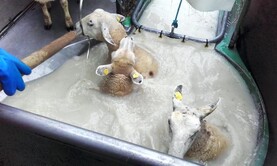A pilot project in Wales successfully tracked the spread of sheep scab between neighbouring flocks and allowed measures to be put in place to eradicate the disease on infected farms.
Dr Neil Paton, a vet and lecturer at the Royal Veterinary College, was involved in the management of the project.
“We found that with the right encouragement, farmers will co-operate and work together to deal with a scab issue once its identified in their area,” he told the Irish Farmers Journal.
Scab is caused by a mite and can lead to wool loss, reduced animal performance and welfare issues.
The pilot project involved working with three farms across Wales that had unrelated outbreaks of scab this spring.
From infection to clinical signs is usually between two to four months
Neighbouring farmers were contacted, and sheep were blood tested across 12 flocks to see if they were at an early stage of scab infestation.
“None of the neighbouring farms had clinical signs of the disease, but half of them gave positive results so they had exposure to sheep scab and needed treatment,” Paton explained.
“From infection to clinical signs is usually between two to four months, but that is hugely variable and depends on the likes of infection load, immunity in the animal and how much wool is on the sheep,” he added.
Blood test
In the Welsh project, an ELISA blood test was used to detect the antibodies a sheep produces when it is exposed to the sheep scab mite.
You need to co-ordinate treatments across infected farms in a local area within a very short space of time
The antibodies can be detected two weeks after infestation so treatments can be introduced early on. Treatment is usually in the form of plunge dipping with organophosphate (OP) based dips, or use of injectable wormers.
“You need to co-ordinate treatments across infected farms in a local area within a very short space of time to stop the onward spread of scab,” Paton said.
The success of the pilot project has raised hopes that a wider scheme could eventually be rolled out across Wales, although it is dependent on the availability of funding.
A group of industry representatives have been pushing for a sheep scab eradication programme to be introduced in NI. No laboratories in NI carry out the ELISA blood test for scab, but local vets can send samples to Edinburgh-based company, Biobest.
National programme
Paton is clear that a national scheme would be based on the same principles of the pilot project where flocks around infected farms are tested, and treatments implemented under veterinary advice.
It would not involve a return to measures such as compulsory annual plunge dipping.
Unless everybody pushes in the same direction, we are always going to be chasing our tail
“We wouldn’t want to be doing blanket treatments with OP dips or anthelmintics [wormers] in this day and age,” Paton said.
He described the prospect of securing funding for a national sheep scab programme as a long-term ambition, but in the more immediate future, he sees scope for private vets to implement lessons from the pilot project in their areas.
“Unless everybody pushes in the same direction, we are always going to be chasing our tail,” Paton said.






 This is a subscriber-only article
This is a subscriber-only article












SHARING OPTIONS: